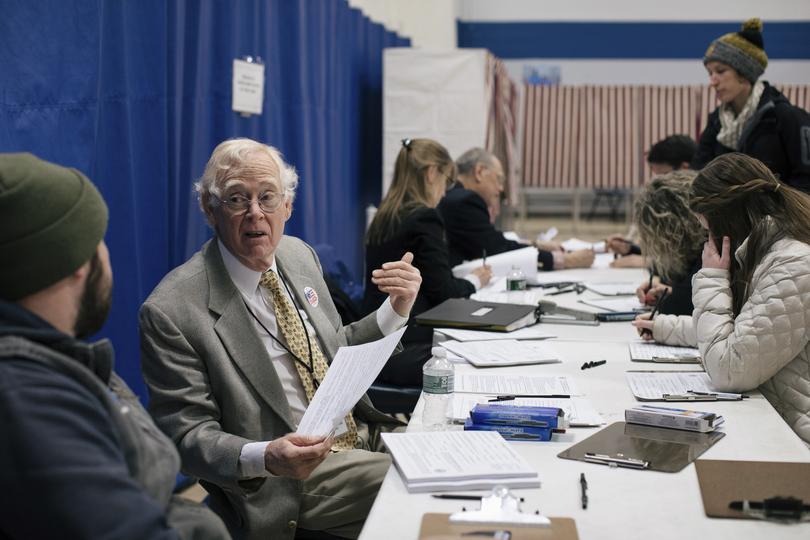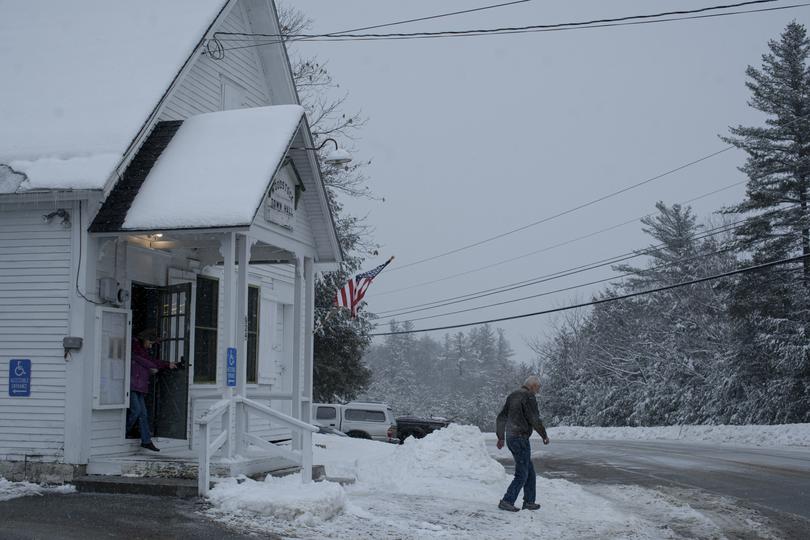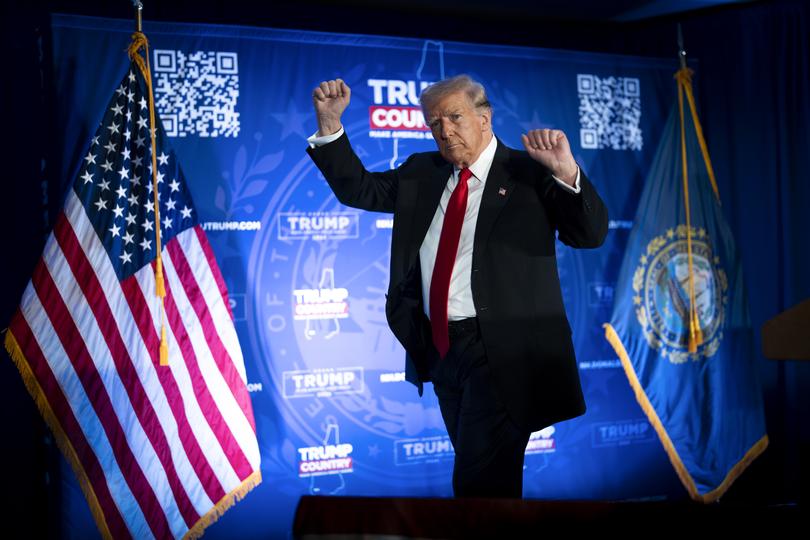The New York Times: How the New Hampshire Primary works and what it means for Republicans and Democrats?
How is New Hampshire’s state primary different to Iowa’s caucus? Why does it mean more for Republicans than Democrats? And why isn’t Joe Biden’s name on the Democratic party’s ballot? Let’s break it down.
New Hampshire voters will head to the polls Tuesday, local time, for the nation’s first primary election, where Nikki Haley is hoping to make a dent in former President Donald Trump’s delegate lead after his big win in the Iowa caucuses. Voting in the state technically starts at midnight, but the vast majority of polling places will open at 7am, local time, (11pm Tuesday AEDT).
Here’s what else to know:
When is the New Hampshire primary?
Sign up to The Nightly's newsletters.
Get the first look at the digital newspaper, curated daily stories and breaking headlines delivered to your inbox.
By continuing you agree to our Terms and Privacy Policy.This year’s primary is set for Tuesday.
Why is New Hampshire first?
The simple answer is because it’s the law: A state law passed in 1975 mandates that the election must take place at least a week before any other state’s primary.
The Granite State’s tradition of voting first existed long before the law was passed. Its original first-in-the-nation contest took place in 1920, when 16,195 Republicans and 7,103 Democrats turned out on March 9.
The state has clung to the tradition ever since. Going first has its benefits: Every four years, the political spotlight brings with it an influx of out-of-state cash, media and attention to the small and sparsely populated state.
How does the New Hampshire primary work?
On Tuesday, New Hampshire voters will head to polling places in their town or city to cast ballots for whom they want to be the Democratic or Republican presidential nominee.
Ballots will be tabulated by vote-counting machines. Poll workers will read and hand-count write-in votes, like those for President Joe Biden, who will not appear on Democratic ballots. The Democratic Party changed its primary calendar, bumping New Hampshire from the top spot in favour of South Carolina, but New Hampshire declined to move its date and is holding a Democratic primary anyway. Biden declined to participate, so supporters have mounted a write-in campaign on his behalf, but no delegates will be awarded.
The vote totals on Tuesday will determine how many delegates to the Republican National Convention each Republican candidate will receive from the state. New Hampshire awards its 11 delegates proportional to the percentage of votes the candidates receive, but only if they receive more than 10 per cent of the vote.

When will we get results for the New Hampshire primary?
Polls close in most places at 7pm local time (11am, Wednesday, AEDT), and initial results will likely become available soon after. New Hampshire Secretary of State David Scanlan said he expects most votes will be counted on Tuesday night, though media outlets will call the race before all ballots are counted when a winner becomes apparent. The Associated Press plans to call the race no sooner than 8pm (noon, Wednesday, AEDT), when the last polls close. In 2016 and 2020, the AP called the Republican primary in New Hampshire right at 8pm.
Results in the Democratic race may come in later, since it will take election workers extra time to count ballots where voters have written Biden in. Scanlan has predicted that results may be delayed by a matter of hours, but said he expected them to be available before the end of the night, according to USA Today.
When do polls open in New Hampshire?
The majority of voting sites will open at 7am Tuesday (11pm Tuesday AEDT), though different towns may choose to open at different times. In some places, polls will open at 6am (10am Tuesday AEDT); others will open as late as 11am. One town, Dixville Notch, will open polls at midnight and close them shortly after, once all of the town’s six registered voters have cast their ballots.
How and where can I vote in New Hampshire?
New Hampshire residents can find their polling places by entering their town and street on the Department of State’s website. The site will provide the address of the polling place as well as the hours it is open.
New Hampshire holds closed primaries, which means Democrats and Republicans can only vote in their own party’s primaries. But independent voters, those who are not affiliated with either party, can vote in either primary — and they make up nearly 40 per cent of New Hampshire’s electorate.
Trump has falsely claimed that Haley is counting on Democrats to “infiltrate” the Republican primary, but it is too late for registered voters to change their party affiliation. The deadline to switch parties was in October. Republicans will not be able to vote in the Democratic primary and Democrats cannot vote in the Republican primary. Independents can vote in either primary on Tuesday, and do not need to decide ahead of time which primary they will participate in.

New Hampshire residents who are at least 18 years old and have not registered to vote can do so at polling places Tuesday. They must bring identification and proof of residency or sign an affidavit attesting to their eligibility.
How is the process different from caucuses?
Primaries and caucuses operate differently, though both result in a race call — hopefully.
While polls will be open for most of the day in New Hampshire’s primary, caucuses usually last only an hour or two. Iowa’s Republican caucuses this month began promptly at 7pm, and anyone who could not make it to a precinct at 7pm could not cast a ballot.
Primary elections are run by state governments. Caucuses are run by state parties.
In primary elections, voters casting ballots in person check in with election workers when they arrive at their voting site. Ballots in hand, they proceed to voting booths and mark their selections in private, then turn their ballots in.
In New Hampshire, ballots are tabulated at polling locations after voting ends. Results are announced at each site, then collected by the state early the following morning. The final statewide results will be posted on the Department of State’s website shortly after.
At a caucus, people sit in the same room and listen to short speeches from supporters of the candidates before organisers pass out ballots. People mark them at their seats and pass them forward to organisers, who count them by hand and on-site, immediately. The results are then announced to the caucus.
Is there absentee voting in New Hampshire?
Yes. Anyone who cannot appear in person at a polling place on Election Day because of illness, disability or absence from the state can vote absentee in New Hampshire. The last day to request an absentee ballot was Monday, Jan. 22.
Ballots submitted by mail must be received before 5 p.m. Tuesday by election officials. They can also be delivered by hand to clerks’ offices the day before the election, or dropped off at the voters’ polling place on Election Day by someone acting on their behalf, such as a family member, friend or neighbor.
What’s on the ballot in New Hampshire?
Democrats and Republicans will both vote for their party’s presidential nominee. No other races will be voted on.
On the Republican side, 24 names will appear on the ballot — including Haley, Trump and Florida Goveronor Ron DeSantis, who on Sunday joined the ranks of candidates who qualified for the ballot but have since dropped out, including Chris Christie, Vivek Ramaswamy and Mike Pence, among others.

Democrats will have 21 names on their ballots, including Rep. Dean Phillips of Minnesota and Marianne Williamson, a progressive self-help guru who previously ran for president in 2020. Notably absent from the list is Biden, though his supporters in the state are encouraging voters to write his name in.
New Hampshire residents can find out exactly what their ballot will look like by selecting their town and political party online on the secretary of state’s website.
Why isn’t Biden on the ballot in New Hampshire?
Biden’s name won’t be on Democratic ballots in New Hampshire and he hasn’t campaigned there. The Democratic National Committee reshuffled the order of its primary contests, putting South Carolina first in an effort to better reflect the demographic makeup of the modern Democratic Party.
Zero delegates will be awarded to the winner of the Democratic primary in New Hampshire, rendering the contest purely symbolic or, more bluntly, meaningless. This has rankled Democrats in the state, who have called the party’s rule change “a terrible decision” and warned that it would “disenfranchise and confuse voters.”
How many delegates are at stake in New Hampshire?
Democrats will award zero delegates, but Republicans will award 11. In total, the GOP will allocate a total of 2,429 delegates before its convention in July. Forty delegates were allocated by the Iowa caucuses. Trump won 20 of them.
What’s next after New Hampshire?
For Republicans, Nevada will be the next state to weigh in on their nominating contest. The state party is holding both a primary on February 6 and a caucus on February 8, though only the caucus will award delegates. The confusing redundancy is happening because the Nevada Republican Party voted to hold a caucus, but that decision runs afoul of a 2021 state law establishing state-run presidential primaries.
The first DNC-approved primary will take place on February 24 in South Carolina, where there are 63 delegates at stake for Democrats and 50 for Republicans.
This article originally appeared in The New York Times.
© 2024 The New York Times Company
Originally published on The New York Times
